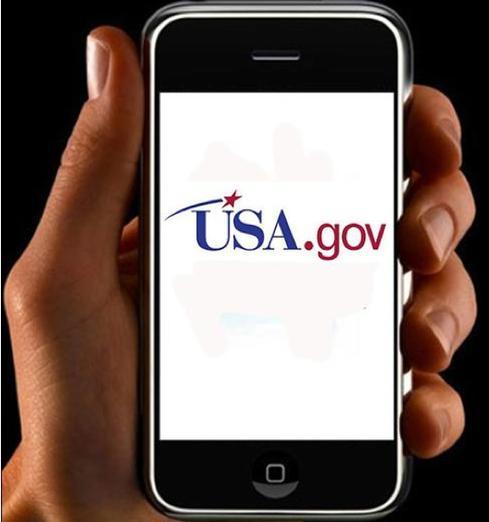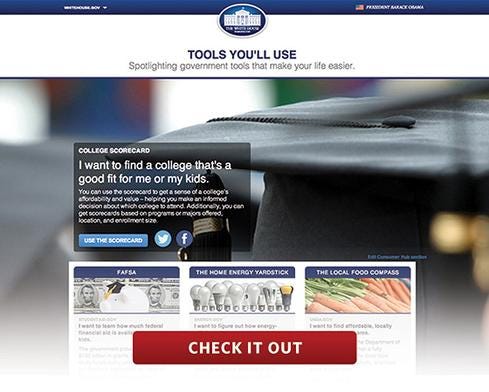Smart Government: All About Disruption
Smartphones and big data have changed expectations for how people communicate and find information, but government agencies aren't yet adapting, says Forrester report.


5 Online Tools Uncle Sam Wants You To Use
5 Online Tools Uncle Sam Wants You To Use (Click image for larger view and slideshow.)
Government agencies must find better ways to harness data to meet citizens' high expectations for service delivery in an age of unprecedented volumes of data and pervasive mobile connectivity, according to a new report.
In its June 3 report, "The Age of the Citizen: Smart Governments Embrace and Enable Disruption," Forrester Research says today's social media-driven world means agencies at all levels of government must engage with citizens in ways that lead to improved service, data-revealing transparency, and participatory policymaking.
"Empowered citizens are increasing demand for more government transparency, increased operational efficiency, and better government service delivery, ushering in the age of the citizens," states the report. "Social and mobile technologies have recast citizens' expectations for service, and improved data collection and analysis, coupled with innovative thinking, allow governments to deliver new and more appropriate programs and contacts."
The challenge, Forrester says, is for government to use digital disruption to its advantage. To keep in step with empowered citizens, governments must find ways to transform the constituents' experiences, embrace mobility, and turn big data into fresh insights.
[Can data improve people's lives? See Federal CIOs, Take Open Data To Next Level.]
When it comes to a comprehensive mobile strategy, the government sector lags behind other industries, according to Forrester. Only about 36% of all governments have comprehensive mobile strategies, compared to 50% in other sectors.
The pervasiveness of smartphones means citizens are used to using local governments' mobile applications to handle a variety of administrative tasks, such as renewing a driver's license, paying a parking ticket or water bill, or even, in some communities, reserving a picnic table at a park, says Forrester. The report recommends that governments advance mobility by pursuing national broadband initiatives, municipal WiFi, government-approved mobile authentication applications, and mobile application development contests.
In the course of its research, Forrester spoke with national, state, and local officials, as well as executives from private-sector technology companies.
Smart governments become strong players by showing that they can improve access to information and services, enable mobility through new channels, and turn data into insights and innovation to meet constituent needs, according to the report.
"Truly smart governance leverages the new citizen engagement paradigm with a new or improved source of data directly from constituents and puts that rich data to use."
This is achieved through a four-step process that begins with information and data collection and is followed by data analysis and policy development.
By using social media sites such as Twitter and YouTube, state and local governments in particular can obtain valuable input from constituents. This can improve communications between officials and citizens, refine policy, diffuse conflict, and solicit fresh ideas, says the report. In addition to familiar social media tools, the report outlines applications for conducting online town-hall meetings such as Scytl, MindMixer, and PlaceSpeak.
Forrester recommends that governments use multiple social media tools to engage citizens via their mobile devices. To get information about public-safety incidents, local governments are using well known social media sites, as well as off-the-shelf applications tailored for specific municipal services, such as SeeClickFix, CitySourced, and Love Clean Streets.
Only about half of government organizations use data to drive decision-making, while the other half relies on intuition or instinct, the report says. To keep pace with empowered citizens, governments should use big data to help them craft better processes and target specific policies and programs.
In addition, governments must embrace digital channels internally to improve service delivery to citizens, while at the same time providing an external platform for citizens, businesses, and organizations.
One of the most compelling examples of government enabling digital disruption is open data, according to the report. Governments have access to vast amounts of data on government finances, administration, transportation, services, and performance. Making that data openly available enables startups and existing companies to offer more data-enabled services, says Forrester. For example, the New York City Big Apps contest, now in its fourth year, has fostered the creation of hundreds of applications, and many have boosted economic activity and created new jobs.
Find out how a government program is putting cloud computing on the fast track to better security. Also in the Cloud Security issue of InformationWeek Government: Defense CIO Teri Takai on why FedRAMP helps everyone.
About the Author(s)
You May Also Like







